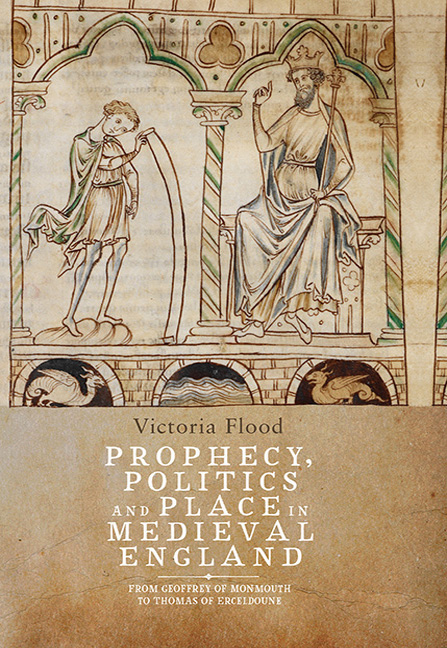Book contents
- Frontmatter
- Dedication
- Contents
- List of Illustrations
- Acknowledgements
- Abbreviations
- Introduction: An Island of the Ocean
- 1 ‘Cadualadrus Conanum uocabit’: Political Prophecy in England, the Welsh March, and Ireland, c. 1130s–1260s
- 2 ‘E si finerount les heirs d'engleterre hors de heritage’: Galfridian Prophecy and the Anglo-Scottish Border, c. 1301–30s
- 3 ‘Whan shal this be?’ The English Erceldoune Tradition, c. 1310s–90s
- 4 ‘A dede man shall make bytwene hem acorde’: Cock in the North and Ceiliog y North, c. 1405–85
- Conclusion
- Bibliography
- Index
3 - ‘Whan shal this be?’ The English Erceldoune Tradition, c. 1310s–90s
Published online by Cambridge University Press: 09 May 2017
- Frontmatter
- Dedication
- Contents
- List of Illustrations
- Acknowledgements
- Abbreviations
- Introduction: An Island of the Ocean
- 1 ‘Cadualadrus Conanum uocabit’: Political Prophecy in England, the Welsh March, and Ireland, c. 1130s–1260s
- 2 ‘E si finerount les heirs d'engleterre hors de heritage’: Galfridian Prophecy and the Anglo-Scottish Border, c. 1301–30s
- 3 ‘Whan shal this be?’ The English Erceldoune Tradition, c. 1310s–90s
- 4 ‘A dede man shall make bytwene hem acorde’: Cock in the North and Ceiliog y North, c. 1405–85
- Conclusion
- Bibliography
- Index
Summary
English prophetic texts from the Scottish Wars of Independence are a distinctive combination of jingoism and pessimism. This is a defining feature of the English prophecies ascribed to the Scottish border prophet Thomas of Erceldoune, also known as Thomas the Rhymer or Thomas Rhymer. The texts discussed in this chapter were composed in northern England between the 1310s and the 1380s or 1390s, although they draw on Scottish background traditions that potentially go back as early as 1286. This places the early compositions roughly contemporary with the Original Prose Version of the Six Kings, to which English Erceldoune prophecy stands in a direct relationship.
Like the Six Kings, the English Erceldoune prophecies are visions of pan- insular high kingship. Also like the Six Kings, they are decidedly anxious about the balance of power on the Anglo-Scottish border, but they incorporate Scottish threats in a vision of cataclysm that far exceeds anything we find in the earlier prophecy. They situate English insular overlordship as the culmination of a long and bloody process, a history in which English defeats appear as often as English victories. In this respect, they represent something of the weariness, and uncertainty, of this period in the northern counties, where the English Erceldoune tradition began. Indeed, the question common to the early Erceldoune prophecies, from which this chapter takes its title, is: when will the Scottish wars end? In the answers given to this, we see a longing for regional stability as much as English victory. These texts tell us something both of the misery of life on the northern border during the wars, and the terms through which the high stakes of insular sovereignty were articulated by authors working in this region, deeply immersed in a long tradition of Galfridian prophecy.
Erceldoune prophecies have long been held to be representative of a type of gnomic folk wisdom with a popular political appeal, possibly even of oral origin. In recent scholarship, they have been located outside the intellectual mainstream of English political prophecy. Certainly, they are highly formulaic, but this is not sufficient evidence alone on which to argue for their origin among a social stratum below those surveyed in the previous chapters, or their extraliterary nature.
- Type
- Chapter
- Information
- Prophecy, Politics and Place in Medieval EnglandFrom Geoffrey of Monmouth to Thomas of Erceldoune, pp. 110 - 154Publisher: Boydell & BrewerPrint publication year: 2016



